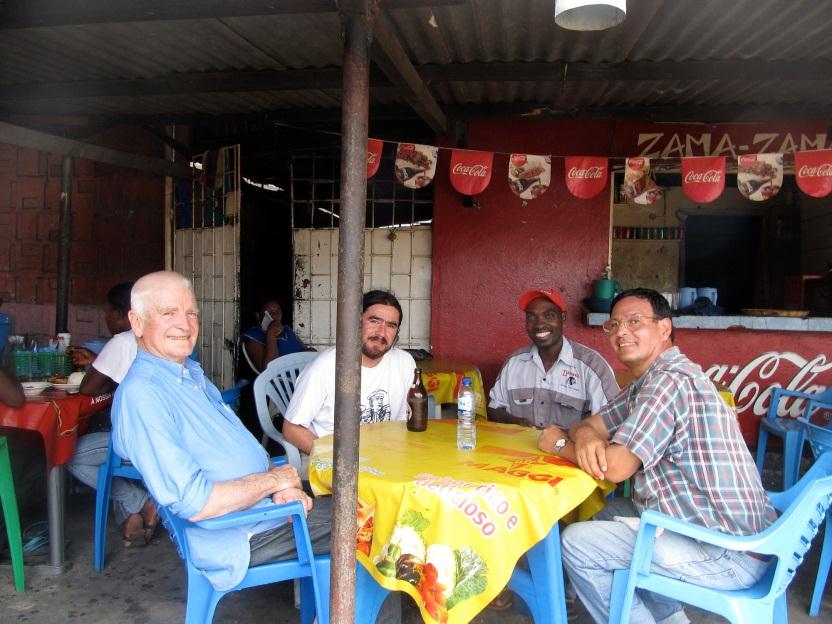Mariano is staying… because when a person like him dies, he stays definitively among us, in our hearts and in our history. Mariano, like all of us has many flaws, but his virtues are so rare, that they eclipse by far everything we might not like about him; the strength of his honest and consistent austerity stands out, as well as the humility of his kind manner, especially attentive to the poorest and most suffering. And we appreciate that his intelligence is not ironic… and that he can sing well and play the accordion.
I remember that one night my namesake, Fr. Roberto Mosher, going down Los Baqueanos street in Peñalolén, with the lights of Santiago at our feet and surrounded by the voices of the neighborhood said to me: “I do not know if we take care of the people or if it is they who take care of us.” And I believe that Mariano Puga has been a priest cared for by the people. The people have recognized in this outsider by birth a profound man truly in love with the way of the poor. The people have accompanied him in every neighborhood where he has been, and he has closely accompanied the lives and ways of all those he has seen in his life, regardless of whether they believe or not. His broad and generous heart has a very good memory. I heard speak of Mariano Puga in 1979 and met him in the winter of ’86, when Rufino invited me to afternoon tea in La Penélope, the hut where Mariano lived in the Digna Rosa quarter. Juan Barraza, The Ticho and two or three more were staying there at that time. They were the hard times of the dictatorship and they spoke of the repression in the area. Mariano was leading the Sebastián Acevedo Anti-Torture Movement, of which my grandmother Josefina was a member. I was impressed by Mariano. Because of the poverty of his style and the news my grandmother told me about him in the street actions; when, for example, he stood in front of a policeman and pointing to his truncheon, said, “you have come here to punish the people, hit me then, here I am, hit me”. My grandmother told me the policeman turned round and ran away.
I am the son of an outsider who became a Marxist and joined the Mir, and I know that falling in love with the way of the poor and giving one’s all to defend them against the unjust aggression of “Mr. Money”, is neither easy nor cost free. But for Mariano the ideal was not a social dynamic but a person: Jesus of Nazareth and his Gospel, when he tells us that God (God Himself!… the Creator of Creation!) was for the poor. It must be said that in the ’60s and ’70s there were many priests and nuns who clearly opted for the poor and became associates in friendship (Bishop Enrique Alvear, Alfonso Baeza, Bishop Fernando Ariztía, Roberto Bolton, Pablo Richard, Blanca Rengifo, Ronaldo Muñoz, Meche and Elena Chaín, Esteban Gumucio, Karoline Meyer, Pepe Aldunate, Anita Gossens, Ignacio Vergara…), Mariano was never a loner. Mariano was very motivated to follow Jesus in the style of the Frenchman Charles de Foucauld, a Viscount who became poor and “brother to all” in following Jesus. Puga became a worker with a team of painter decorators, working each morning until lunch to attend the communities in the afternoons. Once, going to my mom’s house on Lastarria Street I heard: “Robeeeertoooo…!!!” it was Mariano up above the scaffolding, with his paper cone and full of paint that gestured to greet me. Ever attentive to his surroundings. At this moment he is dying in La Minga, his home in Villa Francia, always surrounded by friends.
About the year ’90 or ’91 someone said: “Mariano Puga is present in the consciousness of all the priests of Chile”, and I believe that it is true and that irritates almost all the monsignors and many priests who serve with schedules and ‘respectable conditions’. And this cost him. Mariano sometimes told me about Nestor Paz Zamora and gave me his blog. Néstor Paz was a former Bolivian seminarist (brother of Jaime who was president of Bolivia), who joined the guerrillas leaving after his death a message of love and struggle for a better world. Mariano constantly yearns to be radical. He visited me in 2013 in Africa, months after Pierre Dubois’s funeral, following an interview in The Clinic he titled “The Bishops simply don’t get It.” This brought him problems with those alluded to (although it is now clear – and endorsed by the Pope – that the priest was absolutely right) and Mariano was downhearted. He doesn’t like to be anyone’s enemy. Although not betraying Gospel values, he is friendly even with those who think diametrically opposed to him. He was a cadet in the time of Lieutenant Augusto Pinochet at the Military School, but I doubt he would have given him communion at a Mass after the coup of ’73. He was imprisoned in Villa Grimaldi and told us that an agent of the Dina (Secret Police) approached him asking, “Father, how can I get my son baptized?” Years later Mariano presided over the Liturgy with which the Park for Peace was opened in the same place as the horrific Terranova barracks from where so many people disappeared. In this beloved priest any of us can find a welcome, especially in the troubles they suffer. That is why Mariano will be long in the memory of this Chile which vociferously needs to soothe so many wounds that greed leaves every day in the poor quarters and which violently plucks eyes out trying vainly to hide its sin.
Roberto Guzmán



